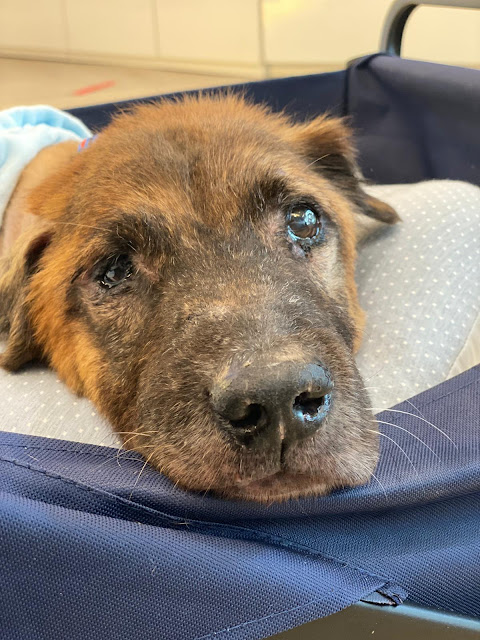What should I feed my dog? This might be one of the first questions that come to mind when we welcome a furry friend into our home. For many new dog owners, the first instinct is to turn to commercial meals. Convenient, cleanly packaged, good marketing and seemingly healthy, commercial meals such as kibble and canned food seem to be the ideal choice at first glance.
Upon closer inspection, however, commercial meals for dogs might not be as beneficial as we are led to believe.
 |
| Harper having dinner |
The issue with kibble
We often see kibble brands boasting the nutritional value of their product, with pellets made from premium protein sources like salmon or lamb. Yet, kibble is derived from a high-heat process that potentially leads to the loss of important nutrients. On the other hand, toxins known as mycotoxins can survive the cooking and extruding process. In the long run, these toxins can lead to immune system damage to our dogs' organs and cause issues in reproduction.
Much of the protein in kibble also comes from highly questionable sources: about 50% of an animal is put aside for human consumption, with the remaining parts sent for use in the pet food industry. These parts may include diseased meat, animal carcasses, and other unwanted animal parts that are not ideal for a dog's diet.
In addition to artificial flavourings and colourings which are used to enhance the flavour of kibble, preservatives such as BHA, BHT and ethoxyquin are used in dry kibble to prevent them from growing rancid. Such chemicals are potentially cancer-causing and are thus detrimental to our dogs' health in the long run.
Finally, kibble is often the cause of the majority of gum disease in dogs. A common belief is that the dryness and texture of kibble can act as a tool to clean dogs' teeth while they chew on them. High carbohydrate content in kibble, however, fuels plaque growth that renders our dogs susceptible to periodontal issues.
 |
| All his life on kibbles, Mantou now loves his new home cooked diet <3 |
How about canned food?
In comparison to kibble, canned food might seem like a more palatable choice for dogs. But like any other commercial pet food, canned food can come with undesirable health consequences.
A recent study has found that even short-term consumption of canned food can lead to a 300% increase in Bisphenol A (BPA) in dogs' blood, which can be disruptive to the endocrine system. Moreover, omega-6 fatty acids are often found in canned food, due to their high content in cheaper oils that are more cost-efficient for pet food manufacturers to use. When consumed in excess, this can be highly inflammatory, especially for senior dogs who might suffer from arthritis.
Although there are regulations put in place in the pet food industry, it is still mostly self-regulated. This means that we can never be sure just how safe commercial pet food is. Thus, the best way to ensure the well-being of our dogs is to turn to alternatives.
 |
| Sofie loves her food although she has a small appetite and requires many small meals throughout the day |
What should I feed my dog then?
HOPE encourages pet owners to provide their dogs with a home-cooked diet for the benefit of their dog's health.
When we think of home-cooked meals, the delicious dinner we ate the night before comes to mind. In fact, some of our stray rescues are used to eating leftover human food like curry rice.
But home-cooked meals for dogs are not the same as those for humans. All our rescues are on home-cooked meals which consist of proteins (pork, chicken, beef etc.), carbohydrates (rice, sweet potato, pumpkin etc) and vegetables. At times, we provide them with animals' heart, liver or blood -- a tasty treat that dogs love. Depending on the dog's age and health condition, the home-cooked meals can be tailored accordingly to suit its needs.
 |
| Egg, broccoli, minced pork, chicken heart and a dollop of yoghurt |
These meals can be prepared in a matter of time and are much more nutritious - not to mention tastier than commercial dog food.
A word of advice, however, if you are thinking of changing your dog's diet to a home-cooked one: take it slow! Many of our rescues such as Chloe, Mantou and Amos, who have been on a kibble diet their entire lives, have had to slowly transition to eating home-cooked meals. This is to prevent issues such as diarrhoea that could arise from a sudden switch.
 |
| Chicken leg, organic bok choy, raw celery, chicken heart and a dollop of yoghurt |
Food is a big part of our lives, and we know how much our furry friends enjoy them too. While commercial meals might seem like the more convenient route, perhaps we should consider providing our dogs with more hearty and nutritious home-cooked meals. After all, it's sure to promise both health and happiness!
Written by: Erin






















